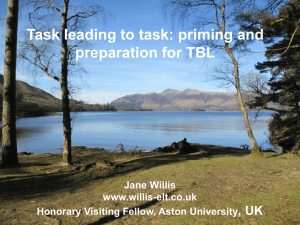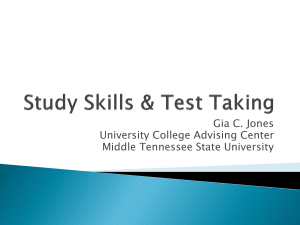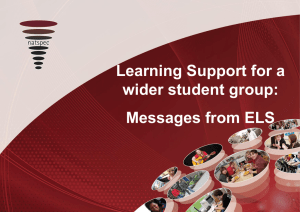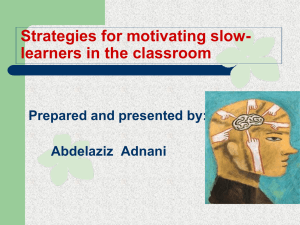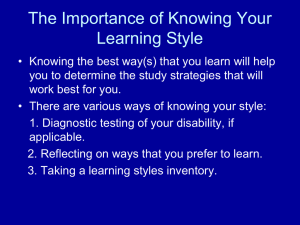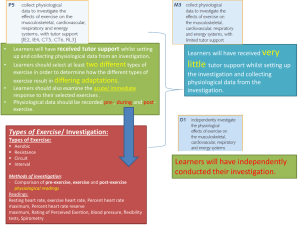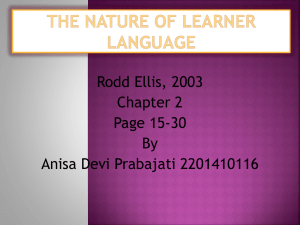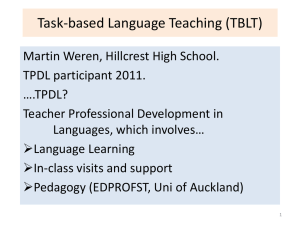From Grammar Point to Task-based Lesson - Willis-ELT
advertisement
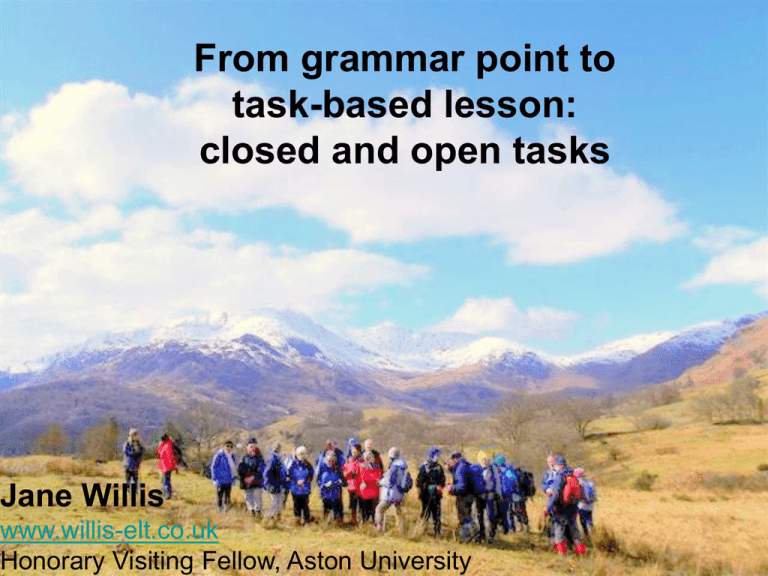
From grammar point to task-based lesson: closed and open tasks Jane Willis www.willis-elt.co.uk Honorary Visiting Fellow, Aston University 1 Overview 1. What we mean by ‘task’ with examples 2. Demonstration of short TBL lesson with rationale 3. Closed and open tasks – workshop mode 4. Predicting language points – workshop with transcripts and findings… 5. Sample ‘closed’ tasks which prioritise certain language items 6. Some ways of designing closed tasks 2 What exactly is a task? When is an activity a task? 3 Characteristics of effective tasks • Would the activity engage learners’ interest? • Is there a primary focus on meaning? (Are learners free to use whatever language forms they choose to?) • Does it have a clear outcome for learners to achieve? (Is completion a priority?) • Is success judged in terms of outcome rather than accuracy of language? • Does it relate to real world activities? The more confidently you can answer YES to these questions, the more task-like the activity. 4 5 Tasks for this picture: a graded task sequence a) Memory challenge: Look at the picture for 20 seconds. How many things can you list in one minute? E.g. fireplace; blue vase with flowers in. b) Yes or No? Teacher led: There are some birds over the fireplace. The blue vase is on the right of the clock. c) Guess what I am thinking of. Here are some clues! it’s on a shelf, you can put things in it ... Now you ask.... d) Look at the picture for one minute and write five quiz questions to give to other teams – to answer without looking. E.g. Where exactly is the cat? e) Picture hide-and-seek. 6 Play picture hide-and-seek Discuss with your neighbour the best place in the room in the picture to hide something small (e.g. a set of keys). Decide together exactly where you would put it/them. 1 minute Change partners. See how quickly you can guess what place they have decided on. Ask them questions – but they can only answer yes or no. (Count the questions.) 7 8 Typical TBL lesson framework Priming & Preparation (exploring topic, useful words & phrases) Task Cycle(s) Task(s) Planning >> Report of outcome Form focus Analysis of text / transcript >> Practice 9 Report stage Choose your best hiding place and tell the class. E.g. Best place for keys - behind the radio on the shelf by the fireplace. Listen and - remember who hid what and where… OR - note down the really good places. OR - take brief notes. Which were the most popular places? Note: there must be a clear purpose for the class to listen or read others’ reports. 10 How ‘closed’ was this task? • • • • • • Precise goals, predetermined outcome? Strategies set? Vocabulary items predictable? Whole phrases predictable? Grammar predictable? Interpersonal talk & task-oriented language? (What would you predict?) 11 How ‘closed’ was this task? • Precise goals, Yes; predetermined outcome? No, but restricted • Strategies set? variable but limited • Vocabulary items predictable? Yes • Whole phrases predictable? Yes • Grammar predictable? Yes, quite... • Interpersonal talk & task-oriented language? Some predictable… 12 Sample tasks: closed or open? a) How strict were your parents? Find whose parents were the strictest / most easy-going. b) Things on a tray – memory challenge. c) What will life be like in 50 years’ time? List three aspects you agree on. d) Problem page letter about a difficult daughter: what advice would you give to these parents? e) Find seven differences between your two pictures. f) What is the most embarrassing thing that has ever happened to you? Tell your partner. g) List 3 interesting places and say why people should visit them. Share recommendations; vote 13 Closed and open tasks - a cline from closed: a very specific outcome, one predetermined solution; clearly defined parameters; predictable language to open: learners are free to decide on their own solution(s) and ways of achieving them. Less predictable / unpredictable language 14 Can you predict some language items? We recorded several people doing the same picture Hide & Seek task and transcribed what they said. >>Write down your language predictions for the task. Prepositional phrases, expressions of location Question forms: Is it .. ? Are they…? Task-oriented phrases: How many questions is that? 15 Transcripts F OK, it’s your turn to guess. I’ve got a small bunch of keys and I’ve hidden them somewhere in the picture. M Ah let me see. Are they – erm inside the teacup on the table? F No. M. Er.. beside the chair? F No ..[…] M Oh dear. Er... behind the clock? F No. That’s four. [………….] M Oh where can they be? [……] M Inside that little jar with a lid on? F That’s it – you got it in fifteen. M Oh dear. What a long time I M Erm now , I’ve hidden a pen. F Mhm mhm. You’ve hidden a pen. M Yes. F OK. Is it on top of the table? M No. F Is it among the books on the shelf? M No […] F In the pot of - the vase of flowers? M No. F Oh dear – how many questions have I had? M one two three four five […] eight. F Oh dear […] Is it in the letter rack? M Yes. F Oh, Wonderful! How many? 16 Form Focus: analysis & practice • Underline eight phrases of location. • Choose five other useful phrases and read them to your partner. Practise saying them fast! The keys are … a small green pot above the fireplace, … the left of the top shelf, … the lamp. The keys are … a small … pot … the fireplace, … the left of the … shelf, … the lamp. The … are … a … … pot … the …, … … … of the top … , … the lamp. ……………………………………………………… 17 Transcripts F OK it’s your turn. I’ve got a small bunch of keys and I’ve hidden them somewhere in the picture. M Ah let me see. Are they – erm inside the teacup on the table? F No. M. Er.. beside the chair? F No ..[…] M Oh dear. Er... behind the clock? F No. That’s four. [………….] M Oh where can they be? [……] M Inside that little jar with a lid on? F That’s it – you got it in fifteen. M Oh dear. What a long time I M Erm now , I’ve hidden a pen. F Mhm mhm. You’ve hidden a pen. M Yes. F OK. Is it on top of the table? M No. F Is it among the books on the shelf? M No […] F In the pot of - the vase of flowers? M No. F Oh dear – how many questions have I had? M one two three four five […] eight. F Oh dear […] Is it in the letter rack? M Yes. F Oh, Wonderful! How many? 18 Predicting language points occurring in task interactions • How would you advise someone who is about to visit [+ a country / town / area they know] for the first time? • What advice would you give to the parents of a daughter who is rude, disobedient, often lies to them, and who has become friends with a girl they don’t like? (Problem page letter). Source: Nunan (Atlas) and Cox 2005) David Cox got 25 pairs of native-speakers / fluent speakers to record their advice to the parents. Two minutes; 19 average 320 words. You only need 2 or 3 pairs… Findings from recorded data Advice on places to visit (Thailand): past tenses: ‘When I went, I used buses mainly’, ‘you can…’ ; relative clauses + which; comparatives; ‘It’s a…’ + adjective phrases Problem page letter: what advice would you give? Common: modal verb phrases, esp. ‘got to’, conditionals, imperatives Also common: noun / adj + to: e.g. ‘the (..) thing to do is to..’./ ‘it’s important (not) to…’/ ‘it might be an idea to’… / Also ‘try and/ try to…’ Note: very few phrases with modals ‘should’ / ‘ought to’; no usual ‘text-book’ advice-giving phrases such as If I were you I’d.. 20 What are you going to do …? - this coming week-end? Will your paths cross? D Will you be going to Tesco’s this weekend? B Probably, yes. I’ll have to go shopping at some stage. D I might be, as well, so that is a possibility. [..] I’m going to a concert on Saturday night. B What are you going to see? 21 In fifty years’ time? What will life be like in 50 years’ time? List three aspects you agree on. • Findings from recordings - will (I think people will travel more; there’ll be …) - going to (People are going to live longer) - will be +ing; More people will be working from home - will / won’t be able to Nunan task adapted and recorded by David Cox 2005 22 So can we ‘trap’ structures? • Even within a given time frame (future) and a specific context (plans), it is not easy to predict what forms a speaker or writer will choose… • The future is uncertain, so we need to express varying degrees of certainty, as well as prediction, volition, hope etc (lexical choices) • If we restrict learners to ‘going to’ it is no longer language use, since it eliminates choice. Choose one or two forms from the text or transcript to focus on and practise afterwards. 23 • Important not to restrict learners’ choice of forms – using language is all about choice – “what do I want to mean and what is the best way of getting it across?” • You can deliberately constrain the lexical load by using a text (written or spoken) or diagram or a picture as the focus for a more ‘closed’ task. 24 Devising activities, diagrams, pictures which prioritise certain language Order of adjectives: Sets of coloured balls of two different sizes – throw them round the class who catch and keep one; then ask Who’s got a/the big red ball…/ Teacher-led > Child-led.. Coloured shapes in a square – True or False? There are six small blue triangles; There are more x than y; All the/some of the/none of the…) Draw and colour your own square with shapes in. Do not show your square to your partner. Then describe it for your partner to draw and colour. 25 Surveys, quizzes, listing tasks prioritising verb tenses Present Simple - plan and carry out a survey to find out what people generally do after class / in the evenings / Sunday mornings… Collate and report results. - List 5 things your family does before leaving home to go on holiday. Compare lists. How many things in common? Past simple - A busy day: find who had the busiest day. - Tell an anecdote e.g. my most embarrassing experience. Second conditionals - learners do a personality quiz, then write their own in pairs: e.g. How courageous are you? What would you do if … an alien space ship landed in your garden? A. I would hide under my bed. B. …. (Hint: start by brain-storming scary scenarios) . Exchange quizzes. Source: Lamprini Loumpourdi (2005) pp33-39) 26 Prioritising other language items Question forms: survey questionnaires, planning interviews, guessing games e.g. 20 questions Modal verbs: speculation tasks e.g. matching photos of unnamed places to names of countries Noun groups: identifying a person in a picture of a crowded shopping centre or beach scene.. Greetings: list the greeting words and phrases you know in English and in your own language; explain to your partner in what situations you use them. Make a wall display. Note: text-books have many ideas – you may need to add a goal or a specific outcome to ‘taskify’ them. Then try them out with a fluent speaker. Record them x 2 or 3. 27 Summary • Meaning focus - using language is all about choice; help learners to think: ‘What is the best way of getting my meaning across?’ • Use a range of tasks – both closed and open - to get learners using language for a real purpose. • Important not to restrict learners’ choice of forms, but always do some form practice after tasks. • Work from real language data as far as possible: short texts or spoken transcripts of tasks, recorded interviews: learners need lots of exposure. • Recycle and repeat tasks a few weeks later, to give learners a sense of progress. 28 Save time: use your text-books, collaborate with colleagues… Good text-books will have recordings with transcripts; use them for tasks and form focus. Text-book tasks can often be ‘tweaked’ to give learners a specific goal or outcome to achieve; (Do the text-book tasks first then the grammar sections after). Get learners to transcribe task recordings and find extra texts; collaborate with colleagues and share materials ENJOY YOUR LESSONS and DON’T WORK HARDER THAN YOUR LEARNERS… 29 References and TBL lesson plans www.willis-elt.co.uk • Edwards C. and J. Willis (eds) 2005. Teachers Exploring Tasks in ELT. Palgrave MacMillan. [ British Council ELT Innovations Award 2006] • Willis D. 2003. Rules, Patterns and Words: Grammar and Lexis in English Language Teaching. Cambridge University Press • Willis D. &J. Willis, 2007 Doing Task-based Teaching Oxford University Press • Willis, J. 1996,, A Framework for Task-based Learning e-book 2012 http://www.intrinsicbooks.co.uk/online/online.html 30 Useful websites: • An excellent introductory article on TBL by Richard Frost: • http://www.teachingenglish.org.uk/think/articles/a-taskbased-approach • Four articles on TBL by Jane Willis can be found at: • http://www.teachingenglish.org.uk/think/articles/criteriaidentifying-tasks-tbl • Free sample task-based lesson plans at • www.willis-elt.co.uk 31 Miscellaneous slides follow here 32 Devising materials for closed tasks • Try recording people doing your tasks (time limit!); transcribe extracts. You gain more idea of what grammar is typical for that task, and later learners get insights into real language use. • Start lesson with a teacher-led task; you can bring in useful words, phrases and patterns (as in the picture memory challenge, and ball activity) • short texts – e.g. true or false statements on the topic; samples of previous learners’ work 33 Designing tasks to provide a natural context for language use Easier to work from topic or text to task - designing sets of tasks based on specific topics or texts. Write clear instructions, record 2 or 3 pairs doing the task and see what language emerges… Transcribe useful sections. Design form focus exercises exploiting the data. Think of priming activities to activate and introduce vocabulary NB lots of examples in Doing Task-based Teaching Harder to work from grammar point to task and find a natural context for specific language use. We’ve seen today you can prioritise by using simple pictures 34 or diagrams, or quiz or questionnaire formats. Make some short recordings How strict were your parents? Find whose parents were the strictest / most easy-going. A: My Dad is a quiet man really, so he didn't really make me do much at home. He sometimes asked me to wash his car or cut the grass, but I was never forced to do it, and I could usually get some pocket money for it as well. I think my Mum was also pretty easy-going; she let me stay out late with my friends. As long as she knew where I was, she wouldn't mind so much what I did. (Tim Marchand 2007) 35 Recording 2 B: My father was definitely stricter than my Mum. If I had been in trouble at school, it was always left up to him to tell me off. But I wouldn't say that my Mum was easy-going exactly. She would sit me down sometimes and make me do my homework in front of her, or force me to eat my greens, things like that. I guess I was just more scared of my father. >30 seconds (Tim Marchand 2007) 36 Priming task to introduce topic lexis • When you were a child: – – – – – – – – Do you think your parents were strict or easy-going? Did they allow you to stay out late at night? Did they let you go on holiday on your own? When you went out did you always have to tell them where you were going? Did you always have to do your homework before supper? Did your parents make you help about the house? Did you have to help in the garden? What jobs did they make you do? NOTE – use these 3 texts later for Form Focus. 37 Typical TBL lesson framework Priming & Preparation (exploring topic, useful words & phrases) Task Cycle(s) Task(s) Planning >> Report of outcome Form focus Analysis of text / transcript >> Practice 38 So why Task-based Learning? TBL provides learners with natural exposure (input), chances to use language to express what they want to mean (output), to focus on improving their own language and to analyse and practise forms. TBL is more likely to keep learners motivated since it builds on whatever language they know in a positive way. Learners are actively engaged throughout the task cycle, and get chances to think for themselves and express themselves in the security of their group. • Learners become more independent and feel empowered, gaining satisfaction from successfully achieving things through the FL. 39 Tweaking tasks – some hints Find seven differences between your two pictures Hint: provide more than 7 differences – to ensure the Report stage is engaging as pairs will find different ones. Hint: richer language used if they work cooperatively to write a list e.g.‘ So what shall we put?’ Typical language used: question forms: have you got a../ Is there a.. ‘What about the .? intonation questions, PLUS topic oriented language 40 Some more ‘open’ tasks: with same picture and ‘hiding place’ theme • What kind of people do you think might live in this house? Who might they be? Think of five things you could guess about them, and give your reasons. • Have you ever locked yourself out of your home? What did you do? • Hiding places for keys. Where do people sometimes leave a spare set of keys? Discuss the advantages and disadvantages of each place. 41
